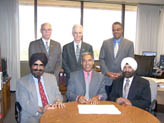Dr. Ranjit Singh Sabharwal Chair in Sikh and Punjabi Studies
Established at California State University, East Bay
The first endowed chair in Sikh and Punjabi Studies in the
California State University system has just been established at CSU
East Bay, named for Dr. Ranjit Singh Sabharwal, a leader in the East
Bay Sikh community who taught mathematics at the university since 1968
and who passed away July 23, 2006 at the age of 81.
"I'm very proud to be part of this collaboration between our
university and the Sikh community in creating the endowed chair in
Sikh and Punjabi studies," said CSU East Bay President Mohammad
H. Qayoumi. "Not only are we creating an important cultural and
academic resource, but we're also honoring Dr. Sabharwal, who for so
many years was a beloved member of this university."
Sabharwal was instrumental in founding the Sikh temples in Fremont
and Hayward and watched them thrive as the Bay Area Sikh community
grew from 20 families in the 1960s to more than 20,000 families.
"My father was always community-minded and also keen that we
maintain support for education as well," said his son, Paul
Sabharwal. "He used to say that 'the university is the temple of
education.'"
In 2003, the professor endowed the Sabharwal Family Scholarship
Fund for CSUEB mathematics students. But that was just the beginning
of his plans to connect the Sikh community with higher education. As a
way to preserve Sikh and Punjabi traditions for future generations and
to further understanding among non-Indians, Sabharwal dreamed of
endowing a chair at CSUEB to explore the language, culture, politics
and religion of his homeland.
"My father was a visionary leader on raising private support
from the community," said Paul Sabharwal. "He was optimistic
that his vision would become reality through the support and
generosity of the Sikh community."
After his father's death, the Sabharwal family, the Palo Alto-based
Sikh Foundation and members of the Sikh community raised $500,000 to
endow a chair in his honor. More than 300 people have contributed,
with the donations ranging from small amounts to exceptionally
generous amounts. This only happened because the members of the Sikh
community knew and respected his father for his generous and tireless
efforts in serving the community, said Paul Sabharwal. This effort
will fund the first endowed chair at CSUEB.
Endowed chairs provide a supplemental source of income to support
the teaching, research and community outreach of a faculty member
appointed by a university. Such endowments are important in attracting
new faculty and students.
"I want to thank the Sabharwal family, the Sikh Foundation and
all the generous contributors who are carrying forward Dr. Sabharwal's
dream of creating this endowed chair," President Qayoumi said.
"He believed that such a sharing of knowledge and language could
only further understanding and peace. We are all dedicated to
achieving those noble goals."

Sitting, from left: Narinder Singh Kapany, Chariman, Sikh
Foundation; Cal State East Bay President Mohammad Qayoumi; and Paul
Sabharwal, son of Dr. Ranjit Singh Sabharwal. Standing, from left: Bob
Burt, CSUEB vice president for University Advancement; Michael
Mahoney, CSUEB provost and vice president for Academic Affairs; and
Benjamin Bowser, interim dean of CSUEB's College of Letters,
Arts, and Social Sciences.
Dr. Narinder Singh Kapany, widely acknowledged as the "father
of fiber optics," established the first North American chair in
Sikh Studies at UC Santa Barbara in 1998. Kapany is the founder and
chairman of the Sikh Foundation and was a close friend of Professor
Sabharwal, earlier a trustee of the Sikh Foundation. Through the
foundation, Kapany is a tireless advocate for the promotion of Sikh
scholarly journals, books, art exhibits and connections to
universities. The foundation has also established Sikh chairs at UC
Riverside and UC Santa Cruz.
These education projects are an important way for Sikhs to ensure
that younger members of their community know their heritage. He also
sees education as a way to promote tolerance for those who follow Sikh
traditions.
"We feel education is an important way of building
understanding," Kapany said.
The College of Letters, Arts and Social Studies will begin
recruiting for a professor to fill the endowed chair in the next
academic year, said interim Dean Benjamin Bowser. The college will
begin offering interdisciplinary courses in 2008 once a professor has
been hired and a curriculum established.
"The courses will be a concentration of studies about a people
and part of the world we know very little about," said Bowser.
"For education, business and government, this is an important
part of the world. We need people who can represent the United States
and do business there. This gives us an opportunity to train students
who will have an impact nationally."
|

